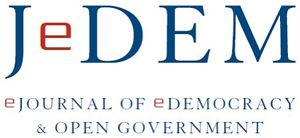Difference between revisions of "Karin Nahon, Alon Peled, Jenniver Shkabatur (2015) OGD Heartbeat: Cities’ Commitment to Open Data"
(Página creada con «URL: http://www.jedem.org/index.php/jedem/article/view/410 Wayback Machine: https://web.archive.org/web/20160710163313/http://www.jedem.org/index.php/jedem/article/view/41...») |
|||
| Line 1: | Line 1: | ||
| − | + | [[File: jedem_compact.jpg| thumbnail | right]] | |
| − | + | == <small>'''Abstract'''</small> == | |
| + | This paper develops and tests a theoretical model, which proposes to examine cities’ commitment to the concept of open government data (OGD) according to three typical levels. Level 1, Way of Life, indicates high commitment to OGD; Level 2, On the Fence, represents either a low or erratic commitment; Level 3, Lip Service, refers to either scarce or no commitment. This study shows that these types exhibit distinct behavior in four key indicators: (1) Rhythm, (2) Coverage, (3) Categorization, and (4) Feedback. This theoretical framework is examined using longitudinal mixed-method analysis of the OGD behavior of 16 US cities over a period of four years, using a corpus of municipal quantitative metadata and primary qualitative data. This methodology allows us to represent, for the first time, cities’ evolving OGD commitment, or “OGD heartbeat”. | ||
| + | |||
| + | == <small>'''Keywords'''</small> == | ||
| + | |||
| + | open government data, cities, transparency, access, open cities, open data benchmarking. | ||
| + | |||
| + | == <small>'''File'''</small> == | ||
| + | |||
| + | [[File: OGD-heartbeat.pdf]] | ||
| − | + | == <small>'''Source'''</small> == | |
| − | + | [http://www.jedem.org/index.php/jedem/index JeDEM - eJournal of eDemocracy and Open Government] | |
| + | |||
| + | == <small>'''Links'''</small> == | ||
| + | |||
| + | '''URL:''' http://www.jedem.org/index.php/jedem/article/view/410 | ||
| − | + | '''Wayback Machine:''' https://web.archive.org/web/20160710163313/http://www.jedem.org/index.php/jedem/article/view/410 | |
| − | |||
| − | [[ | + | [[Category:Library]] |
| − | [[ | + | [[Category:English]] |
| − | [[ | + | [[Category:Austria]] |
| − | [[ | + | [[Category:2015]] |
| − | [[ | + | [[Category:Karin Nahon]] |
| − | [[ | + | [[Category:Alon Peled]] |
| − | [[ | + | [[Category:Jenniver Shkabatur]] |
| − | [[ | + | [[Category:eJournal of eDemocracy and Open Government]] |
Latest revision as of 02:15, 24 April 2017
Contents
Abstract
This paper develops and tests a theoretical model, which proposes to examine cities’ commitment to the concept of open government data (OGD) according to three typical levels. Level 1, Way of Life, indicates high commitment to OGD; Level 2, On the Fence, represents either a low or erratic commitment; Level 3, Lip Service, refers to either scarce or no commitment. This study shows that these types exhibit distinct behavior in four key indicators: (1) Rhythm, (2) Coverage, (3) Categorization, and (4) Feedback. This theoretical framework is examined using longitudinal mixed-method analysis of the OGD behavior of 16 US cities over a period of four years, using a corpus of municipal quantitative metadata and primary qualitative data. This methodology allows us to represent, for the first time, cities’ evolving OGD commitment, or “OGD heartbeat”.
Keywords
open government data, cities, transparency, access, open cities, open data benchmarking.
File
Source
JeDEM - eJournal of eDemocracy and Open Government
Links
URL: http://www.jedem.org/index.php/jedem/article/view/410
Wayback Machine: https://web.archive.org/web/20160710163313/http://www.jedem.org/index.php/jedem/article/view/410
